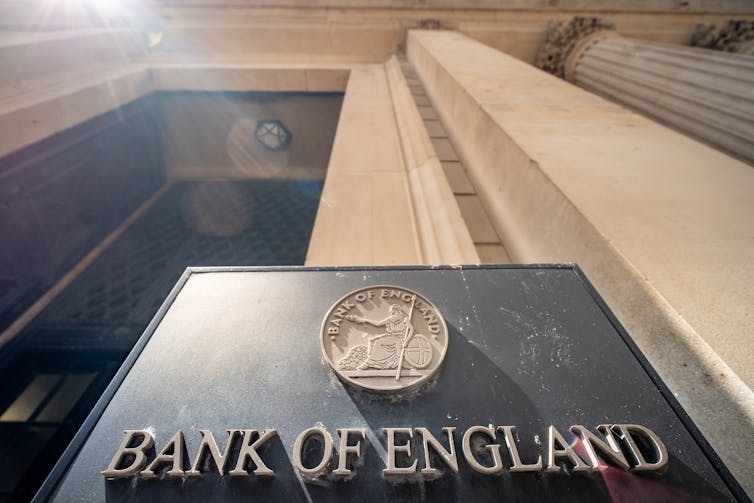
The impact of higher mortgage costs is now biting hard. Three million UK households face the prospect of having to renew their mortgage within the next two years as their fixed-rate periods come to an end. While nearly two-thirds of all borrowers have already remortgaged at more expensive rates, a large number are still waiting to do the same.
The Bank of England’s recent financial stability report highlighted how vulnerable household budgets are to increased mortgage costs. Many are still on fixed rates below 3% for mortgages they borrowed before the interest rates started to rise in December 2021. According to the bank, around 400,000 of these households will experience very large increases in their monthly payments, of 50% or more.
This is because the mortgage rates now being offered are above 5% for two-year fixed-rate deals, and around 6% for house buyers with lower deposits. For a household with a mortgage debt of around £200,000, the UK average, a mortgage rate rise from 2% to 5% increases the monthly repayment costs by about £500.

Mortgage prices are directly linked to the Bank of England’s base rate. They have reached these high levels due to soaring increases in the base rate, as the UK’s central bank sought to reduce inflation to the desired level of 2%.
The good news is that as inflation has now eased from its peak of over 11% in October 2022 back to 2% in May 2024, rates cuts are probable soon. Financial markets expect the first cut by the Bank of England, possibly of 0.25 percentage points, on August 1 2024.
The bad news is that mortgage rates still probably won’t drop to the ultra-low levels of below 2% seen between 2009 and 2021. Historically, mortgage rates had never been below 4% before that period, at least since banking records began in 1853. Experts stress that the new normal for mortgage rates in the medium-to-long term will be between 3.5% and 4.5%. Households have almost no option but get used to these higher costs.
Furthermore, the process of central bank rate cuts is slow. Current market expectations are that the bank rate will ease to an annual average of around 3.5% in 2026. High-street banks charge slightly higher rates for mortgages, compared with the base rate, to cover their operational costs. Hence, there is still a couple of years to go to reach the predicted mortgage rates of 3.5-4.5%.
How are households coping?
In recent years, households have been under pressure due to soaring living costs with inflation high. And while the rate of inflation has been decreasing recently, this does not mean prices are going down. They are still increasing, just at a slower rate.
For some people, robust wage growth and low unemployment levels have helped them cope with the cost of living crisis. But the Bank of England’s latest financial stability report highlights that low-income households suffer most from the effects of increased living costs and mortgage rates.
The bank’s recent survey found that 34% of UK households talked about interest rises putting pressure on their finances. Many cope either by dipping into their savings or putting less aside then they normally would. So, the bank expects many people’s savings to run down in the coming years, making a lot of households less financially resilient.
According to the survey, many households whose monthly mortgage repayment had risen said they were spending less, taking up additional work, or looking for cheaper properties.
How people are making savings:
Those without the comfort of a savings buffer may have fallen into arrears. Others have had their homes repossessed. Both arrears and repossessions rates have been steadily increasing, albeit still lower than during the global financial crisis of 2007-08. Mortgage repossessions by lenders have risen in England and Wales to the highest levels since 2019.
Households also have to borrow for much longer to be able to cope with rising costs. The proportion of first-time buyers with mortgages lasting for 36 to 40 years has increased to almost 20%, compared with only 6% prior to December 2021. These borrowers will have to make repayments well into retirement, given the average age for first-time buyers is now around 34.
Share of mortgages with 36- to 40-year terms in the UK
Options for people in financial trouble
If someone is worried about their mortgage payments and the prospect of renewing at a higher rate, there are a number of options they may consider to reduce the burden. Taking advice from an independent mortgage adviser can help, as they often have access to better deals.
A mortgage can be extended, or switched to interest-only, to lower the monthly costs. However, these options mean it will take longer to repay the mortgage.
Making sure the mortgage is not based on higher standard variable rates (SVRs) is also important. This is the rate borrowers are automatically moved onto if they do not remortgage when their fixed rate ends.
If someone has bought a home using the government’s Help to Buy loan scheme, they should keep this loan as the rates are more competitive.
Finally, there is always the possibility of talking to the current mortgage lender, as banks are usually willing to help borrowers who are facing repayment problems.
Alper Kara does not work for, consult, own shares in or receive funding from any company or organisation that would benefit from this article, and has disclosed no relevant affiliations beyond their academic appointment.
This article was originally published on The Conversation. Read the original article.







